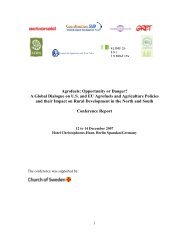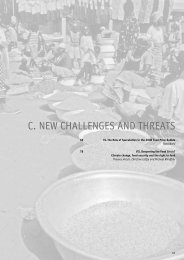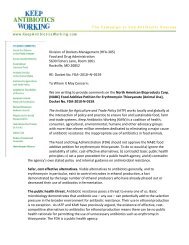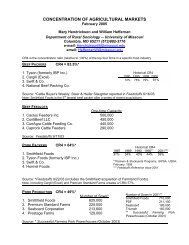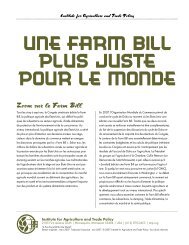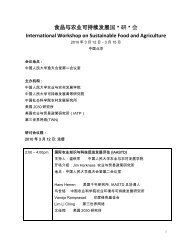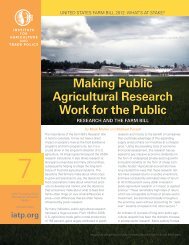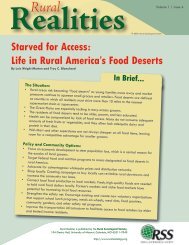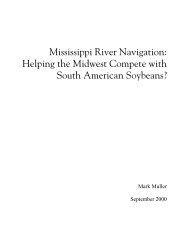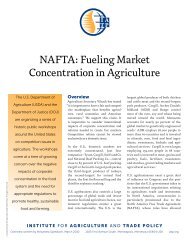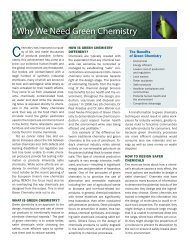IATP Hog Report - Institute for Agriculture and Trade Policy
IATP Hog Report - Institute for Agriculture and Trade Policy
IATP Hog Report - Institute for Agriculture and Trade Policy
Create successful ePaper yourself
Turn your PDF publications into a flip-book with our unique Google optimized e-Paper software.
Section 5<br />
environmental laws, <strong>and</strong> as they had been rejected by the Winnebago<br />
Tribe of Nebraska, 36, 37 Bell Farms approached the Rosebud Sioux Tribe<br />
(RST) of South Dakota in the spring of 1998 with a proposal to erect a<br />
$105 million hog factory on tribal l<strong>and</strong>s. 38<br />
Rosebud Reservation has an 85% unemployment rate <strong>and</strong> is located in one<br />
of the poorest counties in the nation. 39 The need <strong>for</strong> the project was<br />
described as "poverty <strong>and</strong> lack of economic opportunity among<br />
reservations of South Dakota," while the proposed action was to "provide<br />
opportunity <strong>for</strong> economic prosperity to the area <strong>and</strong> tribal members." 40<br />
South Dakota enacted an anti-corporate farming law in 1988 in response<br />
to an ef<strong>for</strong>t by National Farms to establish a hog factory there. In fall<br />
1998, South Dakota's Constitutional Amendment E was passed,<br />
strengthening the State's position against corporate farming. However,<br />
because Indian l<strong>and</strong>s are not subject to state laws, in September 1998, Bell<br />
Farms, Sun Prairie, a Nebraska partnership, <strong>and</strong> the Rosebud Sioux Tribal<br />
(RST) Council entered into a business relationship that would bring hog<br />
factories to the people of Rosebud Reservation. 41 Bell Farms, LLP, signed<br />
an agreement with Sun Prairie to manage the Rosebud Pork Production<br />
Facility. Sun Prairie (the owner) signed a lease agreement with the RST<br />
Council in which Sun Prairie would finance facility construction <strong>and</strong><br />
operation while the RST would put up the l<strong>and</strong>, water, <strong>and</strong> human<br />
resources <strong>for</strong> sites <strong>and</strong> operations, along with various infrastructure<br />
improvements such as roads <strong>and</strong> an electric substation.<br />
Upon completion of both phases of construction, 859,000 hogs per year<br />
were to be marketed under contract to Hormel Foods, Inc., of Austin,<br />
Minnesota. Under terms of the lease agreement between the Tribe <strong>and</strong> Sun<br />
Prairie, the facilities also would not be subject to governmental fees, sales<br />
or use taxes, real estate taxes, or similar assessments.<br />
In addition to 150 estimated jobs during the construction phase, the<br />
completed project was to bring 220 permanent jobs <strong>for</strong> tribal members,<br />
with wages ranging from $16,000 to $50,000 per year. 42 Profits from the<br />
completed venture were projected to be $1,168,320 per year. This amount<br />
was to be split 25-50-25 to Rosebud Sioux Tribe, Sun Prairie, <strong>and</strong> Bell<br />
Farms, respectively, during a 15-year amortization period. At the end of<br />
this period, the lease stipulated that the Rosebud Sioux Tribe could buy<br />
out the facility at 50% of its original cost, or an estimated $50 million.<br />
There is no indication that project proposers ever explained to the RST<br />
Council that the life expectancy of modern hog confinement buildings is<br />
only about 10 to 15 years.<br />
The project was planned in two phases: Phase I, three hog finishing (wean<br />
to market) sites <strong>and</strong> Phase II, five sow production sites <strong>and</strong> five additional<br />
http://www.iatp.org/hogreport/sec5.html (8 of 38)2/27/2006 3:50:13 AM



